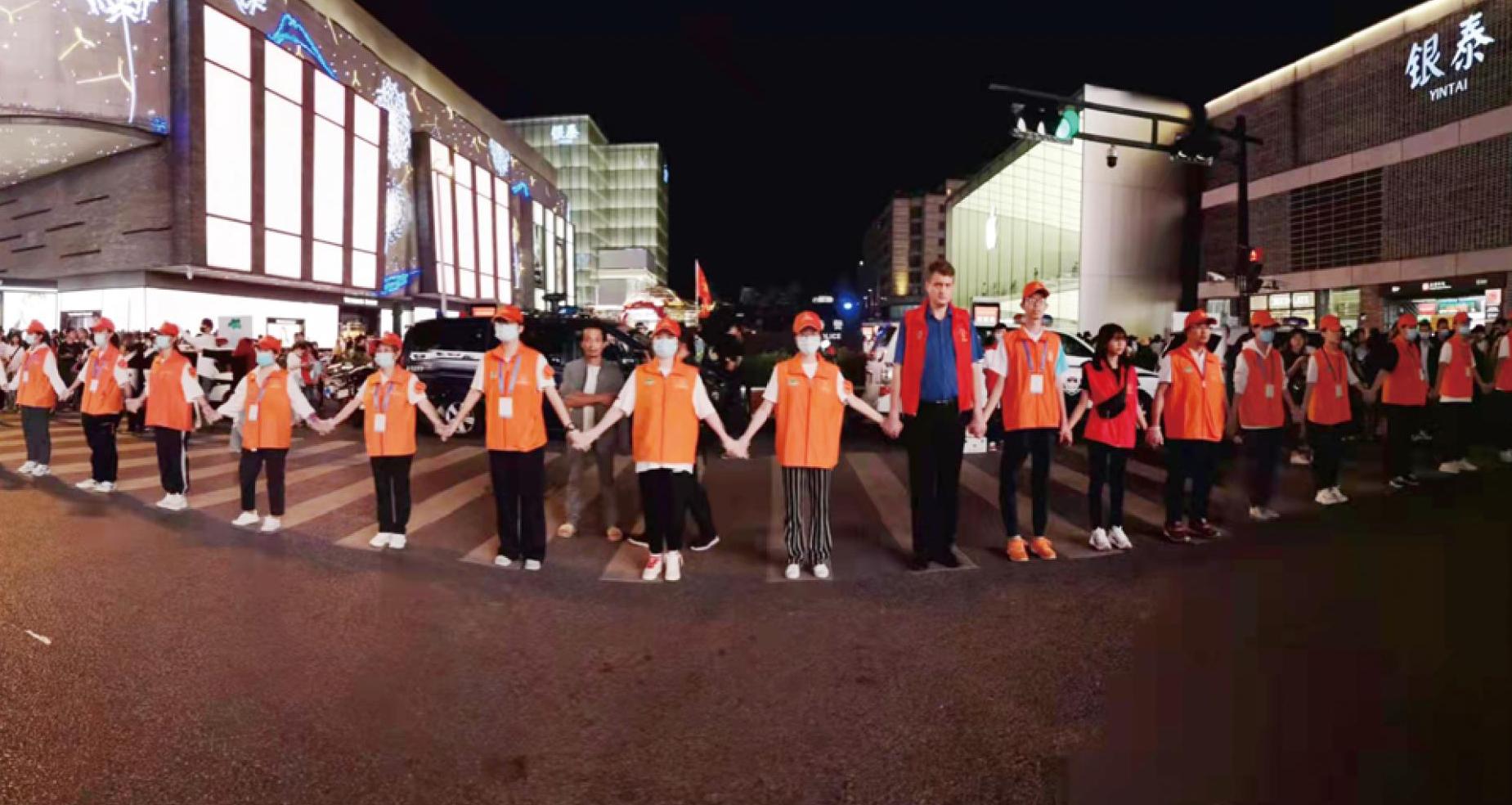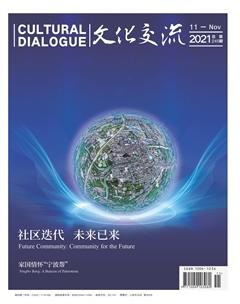在杭州做志愿者
王晓东

我叫王曉东(Vasilii Moshchelkov),来自俄罗斯,是浙江大学光华法学院2017级学生,现在攻读中国法方向博士学位,师从钱弘道教授。在中国读书的经历大大改变了我的生活。中国朋友们帮助了我很多,我也想把我的感谢表达在一点一滴的行动之中。
我热衷于参加公益活动,加入了杭州清河坊社区“young志愿服务队”,也经常参与公民警校国际驿站的活动。来中国9年,我献了9次血。志愿者活动让我找到了一种归属感,既给了我表达感谢的机会,也使我更好地融入杭州这座城市中。
疫情期间,我正好在律所实习,正在帮助华侨公益基金会寻找口罩的张巍律师,邀请我帮忙联系俄罗斯的口罩公司,我欣然答应了。在寻找口罩的团队中,我负责联系工厂,与经理谈价格,解决法律问题。这个看似简单的过程,却有着极大的工作量。为了尽快筹集到口罩,我将生产口罩的公司一一找出,按照时区进行分类,从与北京时间时差最小的公司开始依次联系。还有一些皮包公司混杂其中,我需要仔细地检查质量证明书,以剔除一些骗子公司。因为时差,我需要从当天下午开始跟俄罗斯的公司联络,直至第二天凌晨两三点钟,甚至是四点,然后在早晨八点左右将收集起来的信息和中国的团队进行交流,一天的睡眠时间常常只有四个小时。
当然,我一个人的力量是有限的,我们的团队还有很多人负责物流、清关等工作。在大家的努力下,我们联系到了俄罗斯、泰国、哈萨克斯坦、白俄罗斯、乌克兰以及美国的近四十家口罩公司,为基金会筹集的口罩数以百万计。在浙大学习的这段经历,让我能够把中国法和国际法的知识运用到帮助他人的行动之中,这让我觉得颇有成就感。
志愿服务带来的收获是巨大的。和陌生人交流的恐惧感消失了,我越发觉得自己更加融入杭州了。它也给了我许多契机去接触形形色色的中国朋友,在其中我发现了一条练习中文的捷径。对我这个“老外”来说,语言一直是个迈不过去的坎。虽然来杭州学了一年的汉语,但流利的表达不是一朝一夕就能练成的。除去给予他人力所能及的帮助之外,志愿服务对我来说更是一堂堂听力课、口语课和文化课。在和中国朋友们的交流中,我学到了很多。
中国朋友们的回馈也颇令我感动。记得有一年的国庆节,我在湖滨步行街做志愿者,需要和其他志愿者组成斑马线上的“人墙”,帮助人们顺利安全地过马路,有一个小朋友给我塞了一面国旗,还对我说:“叔叔国庆节快乐,送给你!”还有不少的行人纷纷停下向我们表示感谢。一句句“谢谢”如暖流滋润我的心田,我觉得我的心和杭州这座城市更近了。
在中国,我的生活便利、充实、快乐,这里是我牵挂的地方,我也想尽我的绵薄之力帮助所身处的这个社会。虽然志愿活动常常需要投入大量心力和精力,但我觉得这是值得的。中国人遇到的麻烦就是我的麻烦,中国人遇到的困难就是我的困难。
至于毕业之后的规划,我也有了明确的目标:继续留在风景如画的杭州。为了实现这个目标,我还有很多事情要做:写论文、学习中文、在律所实习、阅读专业书籍…… 我把接下来的寒假安排得满满当当,甚至没给自己留出回家的时间。我认为中国现在是世界上发展最快的国家,无论是在实践领域还是在研究方面,中国都积累了关于国际法的丰富经验。在法学院学习期间,我逐渐了解到这一领域的工作在中国是如何开展的,并且对俄罗斯和中国两种法律体系之间的差异有了更深刻的理解。奉献社会终归是需要依靠知识来充实自己的力量,在勤勉耕耘、日积月累之后,我终会将所学的法律知识运用于实践。
爱国,不光是热爱自己的祖国,热爱自己所生活的国家也是爱国。我早已将中国作为自己的第二故乡,希望中国的未来之路上也会有我的足迹。
A Russian Volunteer in Hangzhou
By Vasilii Moshchelkov
I came to Hangzhou to learn Chinese for a year. However, I was fortunate to go to law school to study for a master’s degree in Chinese law, which has definitely changed my life. All I can say is that my life after coming to China and attending one of its prestigious universities was quite different from before. China is now the fastest-growing country in the world. Whether in economics or in political and legal research, China has accumulated a wealth of experience in international law relations. During my studies in law school, I have gradually learned to carry out work in this field in China, and gained a deeper understanding of the differences between the Russian and the Chinese legal systems.
Truth be told, at the beginning, I found it quite difficult to learn Chinese. While looking for various ways to speed up my Chinese learning, I struck lucky again. For starters, I have always been a keen participant in public welfare activities. In fact, I have already donated blood nine times since arriving in China nine years ago. When in Hangzhou, I joined the Citizen Police Academy International Station organized by Hangzhou Public Security Bureau, and I’m proud to say that I’m a member of the “young volunteer service team” at Hangzhou’s Qinghefang community as well.
It is during volunteering that I found my Chinese significantly improved. The reason why it is one of the best ways to practice Chinese or any other foreign language for that matter is that the fear of communicating with strangers quickly disappears as you try to do your best to help others. Besides, as I found out in Hangzhou, it also proved to be a good opportunity to fast adapt to the local society.
When COVID-19 broke out in early 2020, I was studying Chinese law and international law at Zhejiang University, one of China’s best. I also happened to be on an internship at a local law firm, where a lawyer named Zhang Wei was helping out the Overseas Chinese Charity Foundation seeking masks. He asked me to contact Russian mask companies. I readily agreed.
For me, as a foreigner living in China, I always see the troubles the Chinese people encounter as my troubles, and the difficulties the Chinese people face as my difficulties. China has provided us with a lot of help and convenience, and naturally I want to help the Chinese. Indeed, when I saw the severity of the epidemic and the strength of the Chinese people in dealing with the challenge, I just felt I could not stand by and looked for any opportunity to help others.
In fact, I was only one member of a team looking for masks. I was put in charge of contacting factories, negotiating prices with the managers, and resolving legal issues. In order to raise the masks as soon as possible, I needed to identify companies that produced masks one by one, sort them by time zone, and contact the companies closest to China one by one. Some fake companies were mixed in, and I needed to carefully check the quality certificate to eliminate these fraudulent companies.
This seemingly simple process entailed a huge workload. At four o'clock in the morning, when people were sound asleep, everything was still immersed in the thick of the night, and a lone street lamp was shining stubbornly nearby, I was still working nervously in my room. Because of the time difference, I had to contact the Russian company from the afternoon until two or three o’clock in the morning, or even four o’clock, and then communicate the collected information with the Chinese team at about eight am. Often there were only four hours left for me to sleep.
Fortunately, I wasn’t alone. Thanks to the hard work of the whole team, with some responsible for logistics and some for customs clearance, among other responsibilities, we succeeded in locating quite a number of mask-producing companies and factories. In addition to Russia, nearly forty mask companies in Thailand, Kazakhstan, Belarus, Ukraine and the United States were contacted, and millions of masks were raised for the foundation.
When the virus was contained and life returned to normal, I went back to my regular volunteer work — a traffic assistant — in the Qinghefang community again. At one o’clock in the afternoon, I appear at the green guard box in Qinghefang community and around six o’clock in the afternoon take the last bus back to my place. The roundtrip takes more than two hours.
As to the future, I hope to stay in Hangzhou, a most picturesque city, after graduation. To achieve this goal, I still have a lot to do. For the next winter holiday, I plan to stay in China, as there is no time for me to return to Russia and rest! Working my doctoral thesis, studying Chinese, practicing in a law firm, reading professional books …
Indeed, I have long regarded China as my second hometown. For me, to be patriotic is not only to love one’s birth country but also to love the country in which one lives.
Vasilii Moshchelkov is a Russian student currently studying at the Guanghua Law School of Zhejiang University, pursuing a doctorate degree in Chinese law under the tutelage of Professor Qian Hongdao.

